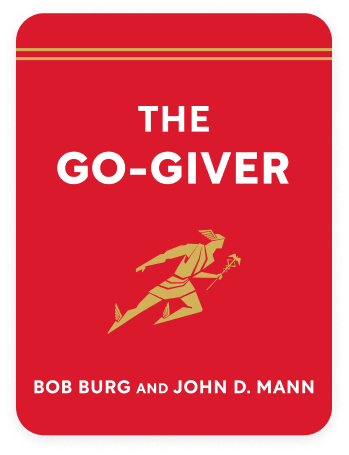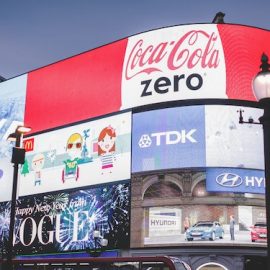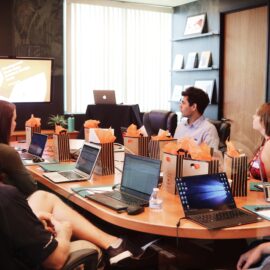

This article is an excerpt from the Shortform book guide to "The Go-Giver" by Bob Burg and John D. Mann. Shortform has the world's best summaries and analyses of books you should be reading.
Like this article? Sign up for a free trial here .
What is the Law of Compensation? How does the character Joe from The Go-Giver learn to apply the law in real-life?
The Law of Compensation states that your income depends on how many people you serve and how well you serve them. This means that your income reflects not only your value or worth but also your impact.
Read on to learn more about the Law of Compensation.
The Law of Compensation
The Law of Compensation: Your income depends on how many people you serve and how well you serve them.
At their second meeting, Pindar introduced Joe to Nicole Martin, CEO of Learning Systems for Children Inc., a maker of educational software sold around the world.
She explained that she was a former grade school teacher who came up with some games for her classes to promote children’s curiosity and creativity. They worked so well that she wanted to share them with more children, so she consulted a software developer about digitizing them. Along with some investors recommended by “the Connector,” Nicole and her developer started an educational software company that ultimately brought her games to twenty-five million children.
Regarding the first two “laws,” she told Joe: The Law of Value determines your potential income. However, the Law of Compensation determines how much you actually earn. It states that your income depends on how many people you serve and how well you serve them. So your income reflects not only your value/worth, but also your impact.
There are two implications of the law, Nicole said:
1) You get to determine your level of compensation—to increase your income and impact, simply serve more people.
2) There’s no limit on what you can earn because you can always find more customers.
This is a variation of the Martin Luther King Jr. quote that “Everybody can be great because anybody can serve”—Everyone can succeed because anyone can give.
However, before she could succeed, Nicole also had to get over her fear of success. She had always believed there were two types of people: those who got rich by taking advantage of others and those—like teachers and nurses—who did good but never made any money. She believed you couldn’t do both—to succeed, you couldn’t be a good person.
When she realized how much this belief was limiting her ability to share her educational software, she changed it and no longer hesitated to promote her product. As Nicole explained to Joe, whether you’re broke or rich is your decision. Therefore you can change it.
As a result of Nicole’s decision to be successful at giving opportunities to more children through her software, her company was now worth $200 million.
Rachel’s Lesson on Serving
In addition to Nicole’s lesson on expanding the number of people you serve, Joe got another lesson from Pindar’s personal chef Rachel—about keeping your focus on serving, even when it’s difficult.
Rachel told him she’d started working at age fifteen to support her family by cleaning houses, doing yardwork, waiting tables, cooking, and answering phones. She later managed to put herself through college doing similar work. Although the jobs were not always enjoyable, she treated each one as though she loved it.
She knew that whether she liked a job or not, each one gave her the opportunity to do three things: survive, save, and serve. These are the universal reasons for working. Work helps you survive by providing money for basic needs and allows you to save for a better life and serve or make a contribution. The most successful people focus on serving.
Pindar first met Rachel at a bookstore where she was the cafe manager. After a cup of her coffee, he realized she had a talent for selecting and preparing coffee in a way that brought out the best flavor and aroma. He offered her a job as his personal chef, which she accepted. She went on to serve coffee to Pindar’s business associates and eventually to many more people when she started her own business.
Applying the Law of Compensation
When Joe dropped off Pindar at his house after the visit, Rachel gave him a pound of her famous coffee. As he headed back to work, he wondered how he could increase the number of people he served.
When he got to the office, almost without thinking, Joe made a pot of coffee and personally served it to every coworker on his floor. All were surprised and pleased that he was taking time to serve them coffee as they struggled with their third-quarter deadlines.
In talking with Gus afterward, Joe realized he’d applied the Law of Compensation. Gus asked him how he’d felt while serving the coffee. Joe said he felt like an idiot, to which Gus replied that sometimes you feel or look foolish when doing the right thing.

———End of Preview———
Like what you just read? Read the rest of the world's best book summary and analysis of Bob Burg and John D. Mann's "The Go-Giver" at Shortform .
Here's what you'll find in our full The Go-Giver summary :
- Why giving will take you further than getting
- The Five Laws of Stratospheric Success
- How giving isn't the same thing as always being nice






